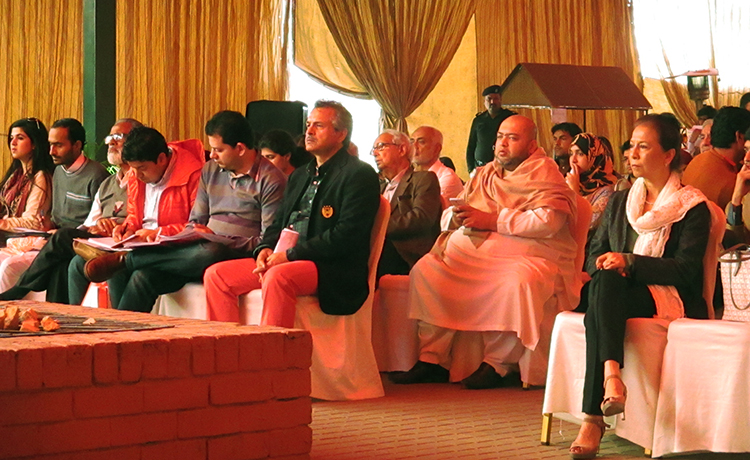Written by: Haniya Yameen
Posted on: February 23, 2016 | 
Prof. Javed Majeed and Nasreen Rehman
Travel was a primary mode of self-discovery for Iqbal. “The act of travel in Iqbal’s poetry,” he explained, “is used to experience and redefine khudi”. Iqbal’s work is replete with metaphors and images of travel through which a deeper realization of the self is attained. One of Iqbal’s poetry collections is titled Bang-e-Dara (‘The Caravan’s Bell’), which signals the start of the journey and “awakens the heart to the possibility of traveling,” noted Prof. Majeed.
He brought attention to Jawid Namah, for instance, where Iqbal gains a profound understanding of the self by traveling through the cosmos and meeting different personalities along the way, with whom he engages in thoughtful conversations. “Travel is not just physical, but also imaginary,” he remarked. “There is an entire internal landscape of selfhood, where the self is clarifying itself through journey.”
Prof. Majeed also claimed that movement and travel is part of the larger Muslim imagination. Iqbal’s use of travel, however, differs from the use of this motif in writings of other writers such as Syed Ahmed Khan, Mirza Ihtisam-uddin and Karim Khan. “For these writers, travel creates a sense of loss of power, whereas for Iqbal, the process of traveling is an enriching and empowering experience,” he observed. This is evident in Jawid Namah where Iqbal is not a passive traveler, but an active interlocutor who discovers the self through his journey.
The question of time and space was important for Indian intellectual writers, Prof. Majeed stated. This is also demonstrated in Iqbal’s Reconstruction, where he heavily draws on references from theoretical physics, as it was changing our conception of time and space. This also ties in to Iqbal’s idea of Islam, which is de-territorialized, mobile and cosmopolitan, noted Nasreen Rehman. This was true, he responded, for Iqbal does not consider travel as de-stabilizing, but rather as providing stability. With efforts from the British such as creating Indian Standard Time, the motif of travel can, in fact, be read as a response to colonialism. “For Iqbal, travel is anti-colonialism. Where the colonial movement roots and freezes consciousness, travel is a transgressive act,” he said.

Responding to a question posed by Nasreen Rehman regarding how Iqbal understood the nature of modernity, Prof. Majeed explained that Iqbal makes a historical argument in Reconstruction and states that modernity is not a purely western contribution, but has roots in ancient civilizations, and as such, Islam has a role to play in it as well.
Prof. Majeed remarked that although colonialism was economically and politically repressive, it also opened many new avenues in intellectual thought. With new global authors and modes of thought to interact with, there was an “opportunity to experiment in poetry and writing, and so the landscape of writing was very fertile,” he stated rather controversially.
At the end of the session, the floor was opened and the audience asked questions pertaining to the concept of khudi, appropriation of Iqbal, and his ideas on nationalism. Prof. Majeed interestingly remarked that the idea of khudi was transgressive in Iqbal, for stronger selfhood gives rise to a greater degree of individuality. It would have been interesting to know Prof. Majeed’s thoughts on Iqbal’s treatment of Rumi as his spiritual guide in Jawid Namah, for both Iqbal and Rumi move in different directions in their travels. Whereas Rumi’s spiritual journey leads one to self-annihilation and unity with the Divine, the journey of Iqbal develops a stronger conception of personality and selfhood.
Punctuated with couplets from Iqbal’s poetry by Prof. Majeed, thoughtful questions by Nasreen Rehman, and a short but engaging discussion with the audience, the session was a treat for Iqbal lovers and was thoroughly enjoyed by the audience.
You may also like: